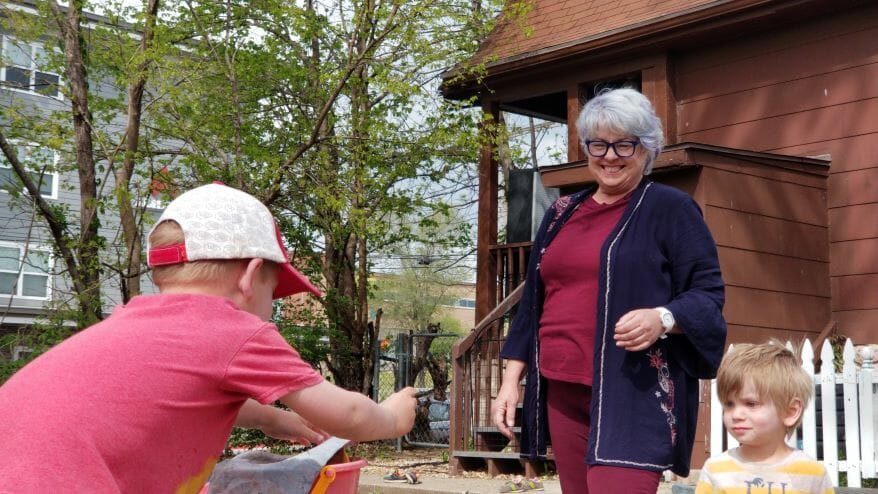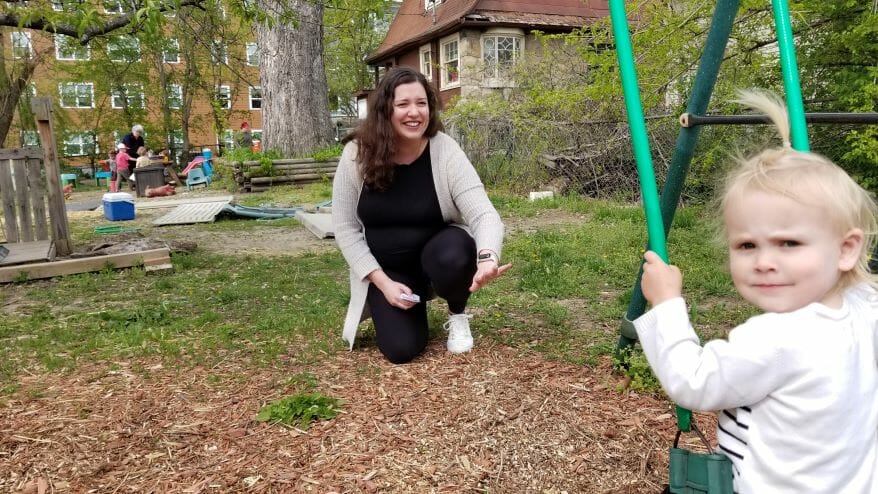Child Care Crisis Challenges Families, Economy A 'Totally Stressed Out' Industry
Published April 26th, 2023 at 9:30 AM
Above image credit: The trip to daycare, from Fairway, Kansas, to Kansas City, Kansas, starts at around 5:30 a.m. for Emily Snyder and her 3-year-old son, Wesley. (Mike Sherry | Flatland)Emily Snyder’s child care trek begins before sunrise, when she leaves her home in Fairway, Kansas, to drive 3-year-old Wesley to his church-based provider in northwest Kansas City, Kansas.
She and her husband are both union tradespeople — she an apprentice electrician, he a carpenter — with unusual schedules that sometimes call for working long days starting at 6 a.m.
Even a normal shift starts at 7 a.m., so for them that knocks out a lot of child care operators that cater to office workers who begin their days an hour or so later, the natural target demographic for providers near Fairway’s predominantly white-collar residents.
Snyder is thrilled with the environment at the KCK center — a big improvement from their previous provider in the Northland. But Snyder would like it even better if she could find a quality home-based operator closer to her neighborhood.
The ideal setting most likely would be a mom who has taken in a few other kids while she is staying home with her own children, Snyder said. “So it is more like a family environment that is, to me, more comfortable than a center.”
Snyder is not the only one hoping for more in-home care options around the region.
Two area nonprofits, The Family Conservancy (TFC) and United WE (UW), are looking to add home-based operators as one way to address a regional shortage of child care slots. It’s an issue that can become even more acute this time of year as summer break approaches and school no longer occupies kids’ time during much of the work day.
Snyder is doing her part as a member of UW’s Kansas Women’s Economic Development Task Force. The organization held a listening tour last summer, which came on the heels of a similar effort in Missouri the year before.
Lack of access to affordable child care was among the common concerns listed by the approximately 800 participants from both states combined.
Through its mission to advance economic and leadership opportunities for women, UW is looking to increase in-home slots by safely reducing regulatory burdens that can be insurmountable for would-be home-based operators.
TFC is providing training to new and existing operators through a four-year, approximately $2 million project in partnership with a Boston-based nonprofit that focuses on bringing to metropolitan areas proven strategies that help low-income children, youth and families.
Pandemic Effects
The listening tours confirmed what UW had learned about the child care business in research that predated COVID-19, said CEO Wendy Doyle.
“It was a stressed industry pre-pandemic, and then you add a pandemic on top of it, and it is totally stressed out,” Doyle said.
TFC estimates that the pandemic eliminated approximately 5,000 child care slots in the nine counties it covers in and around Kansas City.
It also estimates the region can meet only about half the potential demand for child care services, coming up about 62,000 slots short based on data on the number of non-school-aged kids with all parents in the labor force.
Cost also can be a barrier, even if parents can find a slot.
Research sponsored by UW found that, in Missouri, married couples at the poverty line spend an average of 66.6% of their income on center-based care, and that, in Kansas, infant care at daycare centers is 1.3 times more expensive than in-state college tuition.
Tremors from such jarring financial math reverberate in the broader economy.
“It was a stressed industry pre-pandemic, and then you add a pandemic on top of it, and it is totally stressed out.”
Wendy Doyle, CEO of United WE
In summarizing what it heard on the Kansas listening tour, UW noted that, “For many women the cost of care equals or surpasses their monthly income, making it hard to justify staying in the workforce.”
It is because the responsibility for child care (and elder care, for that matter) often falls on the woman in the household that organizations like TFC and UW view in-home care as such an attractive option.
In-home centers mean a woman does not have to choose between working and taking care of the kids, often providing an entrepreneurial outlet for women who open up paying slots for other families.
That is just one reason home-based centers “really fit a niche in the child care fabric in our community,” said TFC CEO Paula Neth. Another benefit, she said, comes when an operator reflects the particular demographics of the area it serves.
“Often your family child care is in your neighborhood,” Neth said, “so it becomes an extension of your family, and especially if you are looking for a provider who is more culturally responsive, that becomes a really important piece.”
But those options appear to be diminishing.
Based on data from 40 states, the national nonprofit Child Care Aware of America tallied a roughly 10% decrease in available family-care slots between 2019 and 2021.
America’s Child Care Landscape
In Sickness and Health
Jessica Goodman is a Garden City, Kansas, mother whose five-year run as a family child care operator ended before the pandemic. She closed her center in 2017 when her kids were old enough to go to school, and she is one of the many women United WE encountered on its Kansas listening tour.

Goodman’s main motivation for opening the center was to be able to stay home with her two children, but her business was also a labor of love for the kids and families she served. She cherished the opportunity to bond with her young charges, even when a stomach bug struck six of them in the same day and Goodman huddled with them in the kitchen.
“Every time you turned around there’s another kid vomiting in a trashcan, in a bucket, or on the floor, because infants don’t understand how to throw up in a bucket yet,” she said. “So it was an experience. We survived it.”
Goodman did not love that the business left little separation between work and home.
Every night she’d make sure everything from knives to nail polish was out of reach. And then, of course, there were all the tasks that came with running her own business, such as keeping the books and collecting payments.
She made the sacrifice to care for her own children. For her and her husband, there was no other choice.
In wanting to keep the fees affordable for families, and wanting to provide the little extras for the kids, Goodman struggled to even break even on the child care business. So when the opportunity arose, she closed her doors to take a part-time position at the local hospital.
Goodman wouldn’t trade the experience for anything, but she doesn’t miss the stress of running a business
“I don’t want to do it again,” she said.
Business Case
The need to expand child care options for families is not, as one might expect, solely a concern of liberals who generally favor expanding safety net services. Corporate America is worried as well.
In a 2021 report it co-published with the Missouri Chamber of Commerce and Industry, the U.S. Chamber of Commerce Foundation wrote that it “has always seen childcare as a two-generation workforce issue: essential to support the workforce of today and vital to develop our workforce of tomorrow.”
The report estimated that child care issues result in an estimated $1.35 billion loss annually for Missouri’s economy, based on factors like turnover and employee absences.
The business angle helps explain this year’s push by Missouri’s Republican governor, Mike Parson, to have the GOP-controlled General Assembly increase child care subsidies and enact tax credits to help child care providers.
Last year, the GOP-dominated Kansas Legislature passed a measure expanding a program that allows businesses to receive a state income tax credit for helping their employees cover child care costs or if the business provides child care itself. Kansas Gov. Laura Kelly, a Democrat, signed the measure.
But Kelly and the legislature are at loggerheads this year, after she vetoed a measure reducing regulatory requirements as a way to add child care slots.
Child care advocates point to a handful of jurisdictions that are leading the way in supporting child care providers.
One example is Washington, D.C., which raised taxes on the city’s highest earners to finance a program that cut child care workers checks of at least $10,000 as a way to top-up their compensation.
Another example is New Mexico, where Gov. Michelle Lujan Grisham, a Democrat, last year extended free care to an additional 30,000 families as part of a wide-ranging child care initiative that also allocated $10 million in grants to expand the availability of child care in high-need communities.
Nonprofit Initiatives
For Doyle and her UW colleagues, it was heartbreaking to hear couples — especially in rural areas — talk about not starting families due to a lack of child care options. The discussions during the listening tours illuminated how licensing red tape blocked women entrepreneurs who could help alleviate that problem for young couples.
UW heard stories of applicants still awaiting word six months after submitting for a state license. Anecdotes also led UW to conclude that the inspection process needs to be more consistent throughout the state.
Goodman, the Garden City mother, also said it would be better for operators to at least have a heads up that a spot inspection was due some time during a given week. The fact that an inspector could show up on any given day, she said, added to the stress of running her business.
It gets even messier at the city and county level, Doyle said, where a home-based center serving food to children might have to secure a restaurant license and submit to the ongoing inspections the license requires.
“It’s barrier, barrier, barrier,” Doyle said. “So what we really want to do is just shine a light, share the evidence, and see what kind of reform we can come up with.”
With a $475,000 grant from the Ewing Marion Kauffman Foundation, UW has established the Women’s Entrepreneur Childcare Project. The project’s objectives include a state-by-state child care licensing research study and a nationwide survey of mothers who are entrepreneurs.
The idea is to persuade policymakers in Missouri and Kansas to implement best practices from around the country.
UW expects to issue the state level report in November. Complementing that work will be a separate initiative to review county and municipal level licensing requirements in Missouri and Kansas, which is scheduled for completion early next year.
Solving the child care shortage, Doyle said, also means addressing related issues such as low pay for child care workers and, especially in rural areas, more than just spotty broadband internet access.
Working through what it’s calling the staffed family child care network, TFC is teaching in-home providers the nuts and bolts of operating a small business. The training includes on-site coaching and 10-session group learning for specific cohorts. The first cohort went through last year.
The intent, Neth said, is to establish 600 new child care slots and improve the operations of an additional 1,600 additional spaces.
TFC is raising money for the program, and it has received support from local foundations, all of which builds upon $600,000 in startup assistance provided by GreenLight Kansas City.
The national GreenLight Fund vets social programming around the country, and then funds best practices in the dozen communities in which it works. Kansas City became a GreenLight site in 2018 when local funders and philanthropists raised $4.4 million to assist in its work within the community for five years.
The child care program it has brought to Kansas City is All Our Kin, a Connecticut-based program that for more than 20 years has provided resources and training to operators of home-based childcare operators.

Love Over Loot
Kelly Raines’ maternal grandmother had a saying: “A dirty child is a happy child.” And if you visit the child care center Raines operates out of her home in Kansas City’s Hyde Park neighborhood, you will understand why the Birdsall House bears grandma’s last name.
On a nice afternoon early this week, one little guy was making a messy concoction at the backyard picnic table while talking to Raines about tornadoes and hurricanes. A couple of others toddled through the patchy grass to a swing set on the far side of the big backyard.
Raines went into business for herself eight years ago after working for more than three decades in early childhood, really getting turned off by the rigidity of the larger, center-based child care operators.
She opened Birdsall House, she said, “with the hope of bringing joy back to childhood.” She ditched the model of segregating kids by age, in part to allow siblings to play with one another.
The mixing of age groups is one aspect that appeals to Katie Freeze, who was there to pick up her 2-year-old daughter, Leah.
Leah has already picked up the basics of potty training by watching her child care partners. And Freeze loves that the older children read to Leah and help her explore outside.
Freeze also said Birdsall House “feels very much like it is part of my community,” given that the family lives about a mile south of the center.

Raines has a contractor refurbishing the 18,000-square-foot freestanding garage next to the house into a space that can serve 20 children between the ages of 6 weeks and 12 years old.
That would be four more than her current license allows, and it would free up the house space to serve more of the Birdsall House “graduates,” former charges that Raines watches when they are off school for breaks.
Raines’ passion for the kids does not extend to the business aspects of Birdsall House. That’s why she appreciated the classes she took as part of last year’s All Our Kin cohort through TFC.
She charges more to take care of younger kids, so Raines could certainly make more money by not reserving so many spots for her graduates. But that’s not her style.
“I didn’t get into this to get rich,” Raines said. “I got into this to provide the best care that we can.”
Mike Sherry is a former editor and writer for Flatland. He is now a communications consultant for nonprofits and freelance writer.


